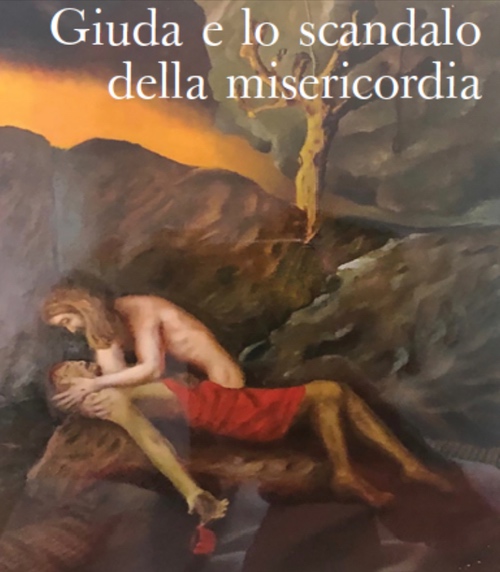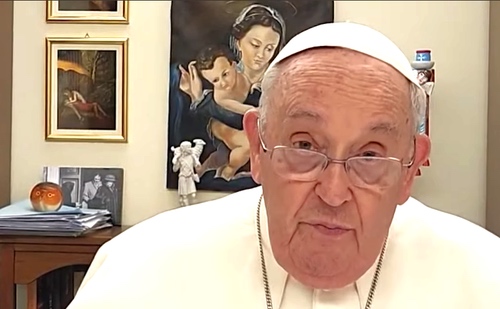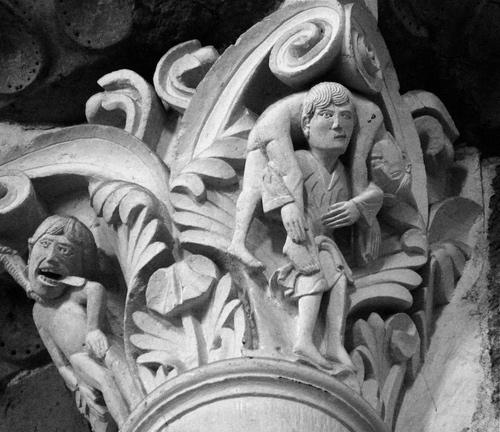
God loves Judas as much as God loves Jesus.
That was an insight I had in my late teens/early twenties as part of growing out of the childhood image of God that had been fed to me of an almighty, all-seeing ogre who was out to catch me out and punish me for whatever I did (or thought!) that was wrong.
The insight came back this week when traditionalist Roman Catholics criticised Pope Francis for having the above painting in his study, a painting of Christ comforting/embracing Judas after Judas’ death.

The criticism was both of the nudity in the image (have they ever been to the Vatican?!) and of the compassionate approach that it images Jesus having in relation to Judas. There is a conviction, on their part, that Judas is in hell and that Pope Francis is heretical in questioning the certainty of that.
I am touched by the image of the compassionate Risen Christ subverting, undoing, and reversing the kiss by which Judas betrayed Jesus; I am touched by the tree in the image which speaks (on the one hand) of the means by which Judas killed himself (in one of the two conflicting versions of his death – Matthew 27:5 and Acts 1:18), and (on the other hand) of this painted tree speaking of the tree (of life, if you will), the cross, on which Jesus died, saying, “Father, forgive them; for they do not know what they are doing.” (See Acts 5:30; 10:39).

The contemporary painting at the top of this post connects with the capital (shown immediately above) in the 12th Century Benedictine Abbey Church of Sainte-Marie-Madeleine, Vézelay. Pope Francis writes of this sculpture:
The men of the Middle Ages did catechesis through architecture, sculptures, images. On one side of the capital is Judas after he hanged himself, but on the other is the Good Shepherd lifting him onto his shoulders and taking him with him.
Our Father: Reflections on the Lord’s Prayer (2017)
There are various images of “hell” in the Bible, many refer to Jerusalem’s actual burning rubbish dump, an image used as a Middle Eastern metaphorical hyperbole. The Christian imagery of hell that developed stresses our human freedom to reject God, goodness, truth, and beauty. The obsession of many traditionalist Roman Catholics (as well as other Christians) with the idea that the majority of people are destined for God-created eternal suffering, fanned into fanatical flames by pronouncements of so-called “visionaries”, is a worldview that is rightly rejected as unpalatable by people whose atheism, sadly, is assured and confirmed by such perspectives – an all-powerful, all-knowing deity creates thinking-feeling humans and a place where they will experience never-ending excruciating torture; and knows that that is where the majority will end up!
It appears driven by Stage 1 of moral development: doing the right thing for fear of punishment.
Actually, Lent is a great time to bring together our deepening appreciation of our profound sinfulness, of the evil of which I am capable and have actually done AND God’s profound love of us, of me; two sides of the Lenten coin profoundly, movingly expressed in the above painting.
God loves Judas as much as God loves Jesus.
For further reading: Judas and the scandal of mercy (the meaning of the words on the painting at the top) Losservatore Romano article.
Do follow:
The Liturgy Facebook Page
The Liturgy Twitter Profile
The Liturgy Instagram
and/or sign up to a not-too-often email



Some years ago during Holy Week I saw a placard near the entrance of Chester Cathedral with the following poem that has been a source of much reflection for me:
The Ballad of the Judas Tree
by Dorothea Ruth Etchells
In Hell there grew a Judas Tree
Where Judas hanged and died
Because he could not bear to see
His master crucified
Our Lord descended into Hell
And found his Judas there
For ever hanging on the tree
Grown from his own despair
So Jesus cut his Judas down
And took him in his arms
“It was for this I came” he said
“And not to do you harm
My Father gave me twelve good men
And all of them I kept
Though one betrayed and one denied
Some fled and others slept
In three days’ time I must return
To make the others glad
But first I had to come to Hell
And share the death you had
My tree will grow in place of yours
Its roots lie here as well
There is no final victory
Without this soul from Hell”
So when we all condemned him
As of every traitor worst
Remember that of all his men
Our Lord forgave him first
Wow! Thanks, Chase. Blessings